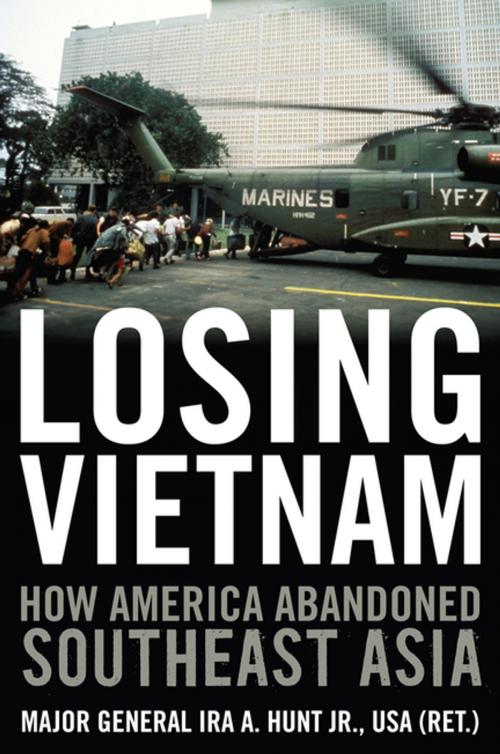Losing Vietnam
How America Abandoned Southeast Asia
Nonfiction, History, Military, Vietnam War, Asian, Strategy| Author: | Ira A. Hunt Jr. | ISBN: | 9780813142067 |
| Publisher: | The University Press of Kentucky | Publication: | June 24, 2013 |
| Imprint: | The University Press of Kentucky | Language: | English |
| Author: | Ira A. Hunt Jr. |
| ISBN: | 9780813142067 |
| Publisher: | The University Press of Kentucky |
| Publication: | June 24, 2013 |
| Imprint: | The University Press of Kentucky |
| Language: | English |
In the early 1970s, as U.S. combat forces began to withdraw from Southeast Asia, South Vietnamese and Cambodian forces continued the fight against the People's Army of Vietnam (PAVN) and the National Front for the Liberation of South Vietnam (NLF), more commonly known as the Viet Cong. Despite the evacuation of its ground troops, the United States promised to materially support its allies' struggle against communist aggression. Over time, however, the American government drastically reduced its funding of the conflict, placing immense strain on the Cambodian and South Vietnamese armed forces, which were fighting well-supplied enemies.
In Losing Vietnam, Major General Ira A. Hunt Jr. chronicles the efforts of U.S. military and State Department officials who argued that severe congressional budget reductions ultimately would lead to the defeat of both Cambodia and South Vietnam. Hunt details the catastrophic effects of reduced funding and of conducting "wars by budget." As deputy commander of the United States Support Activities Group Headquarters (USAAG) in Nakhon Phanom, Thailand, Hunt received all Southeast Asia operational reports, reconnaissance information, and electronic intercepts, placing him at the forefront of military intelligence and analysis in the area. He also met frequently with senior military leaders of Cambodia and South Vietnam, contacts who shared their insights and gave him personal accounts of the ground wars raging in the region.
This detailed and fascinating work highlights how analytical studies provided to commanders and staff agencies improved decision making in military operations. By assessing allied capabilities and the strength of enemy operations, Hunt effectively demonstrates that America's lack of financial support and resolve doomed Cambodia and South Vietnam to defeat.
In the early 1970s, as U.S. combat forces began to withdraw from Southeast Asia, South Vietnamese and Cambodian forces continued the fight against the People's Army of Vietnam (PAVN) and the National Front for the Liberation of South Vietnam (NLF), more commonly known as the Viet Cong. Despite the evacuation of its ground troops, the United States promised to materially support its allies' struggle against communist aggression. Over time, however, the American government drastically reduced its funding of the conflict, placing immense strain on the Cambodian and South Vietnamese armed forces, which were fighting well-supplied enemies.
In Losing Vietnam, Major General Ira A. Hunt Jr. chronicles the efforts of U.S. military and State Department officials who argued that severe congressional budget reductions ultimately would lead to the defeat of both Cambodia and South Vietnam. Hunt details the catastrophic effects of reduced funding and of conducting "wars by budget." As deputy commander of the United States Support Activities Group Headquarters (USAAG) in Nakhon Phanom, Thailand, Hunt received all Southeast Asia operational reports, reconnaissance information, and electronic intercepts, placing him at the forefront of military intelligence and analysis in the area. He also met frequently with senior military leaders of Cambodia and South Vietnam, contacts who shared their insights and gave him personal accounts of the ground wars raging in the region.
This detailed and fascinating work highlights how analytical studies provided to commanders and staff agencies improved decision making in military operations. By assessing allied capabilities and the strength of enemy operations, Hunt effectively demonstrates that America's lack of financial support and resolve doomed Cambodia and South Vietnam to defeat.















